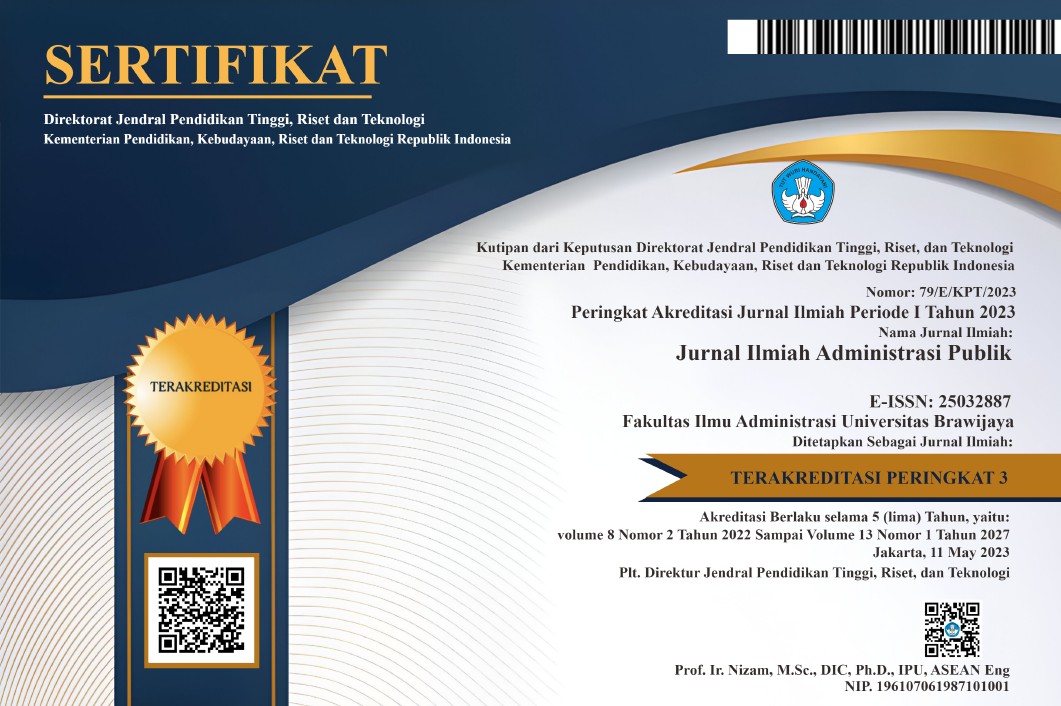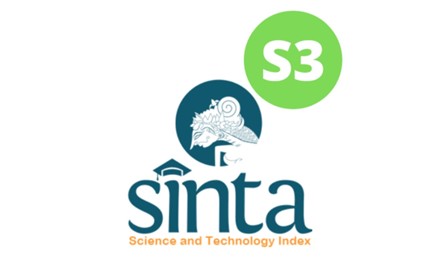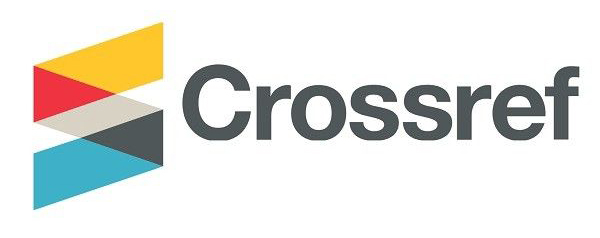Smart Governance and Smart Cities: A Review of The Literature
DOI:
https://doi.org/10.21776/ub.jiap.2020.006.01.19Keywords:
smart city application, IT, e-governance, urban living, urban community, challengesAbstract
An application based technology so called as smart city can be easily accessed by citizen and government. The government information could create safety and comfort in order to service better future life for their citizen. The main purpose of writing this paper is to gain an overview of the smart city concept using a qualitative approach, by a comprehensive review of the literatures. The conclusion from this paper could provide clear information from the most recently scientific articles focus on smart cities. This paper could be a basis for future researchers for another investigation.References
Ahvenniemi, H., Huovila, A., Pinto-Seppä, I., & Airaksinen, M. (2017). What are the differences between sustainable and smart cities?. Cities, Vol. 60, pp. 234–245.
Albino, V., Berardi, U., & Dangelico, R.M. (2015). Smart
cities: definitions, dimensions, performance, and initiatives. Journal of Urban Technology, Vol. 22, No. 1, pp. 3-21.
Angelidou, M. (2015). Smart cities: A conjuncture of four
forces. Cities, Vol. 47 (September), pp.95–106. https://doi.org/10.1016/j.cities.2015.05.004
Bakici, Tuba., Esteve Almirall., & Jonathan. (2013). A smart city initiative: the case of Barcelona. Journal of the Knowledge Economy, Vol. 4, issue 2, pp.135-148.
Caragliu, A., Del Bo, C., & Nijkamp, P. (2011). Smart cities in Europe. Journal of Urban Technology, Vol. 18, No. 2, pp. 65-82.
Cocchia, A. (2014). Smart city. In Renata Paola Dameri., & Camille Rosenthal-Sabroux (Ed). Smart and digital city: A systematic literature review (pp. 13–43). Switzerland: Springer.
Deakin, M., & Al Waer, H. (2011). From intelligent to smart cities. Intelligent Buildings International, Vol. 3, No. 3, pp. 140-152.
Dhingra, M., & Chattopadhyay, S. (2016). Advancing smartness of traditional settlements-case analysis of Indian and Arab old cities. International Journal of Sustainable Built Environment, Vol. 5(2), pp.549–563.
Edvardsson, I., Yigitcanlar, T., & Pancholo, S., (2016).
Knowledge city research and practice under the microscope: a review of empirical findings. Knowledge Management Research and Practice, Vol. 14(4), pp.537–564.
Grimaldi, D., & Fernandez, V. (2016). The alignment of
university curricula with the building of a smart city: a case study from Barcelona. Technological Forecasting and Social Change, Vol. 123 (October), pp. 298-306.
Herrschel, T. (2013). Competitiveness and sustainability:
can ‘smart city regionalism’ square the circle?. Urban Studies, Vol. 50, No. 11, pp. 2332-2348.
Hortz, T. (2016). The smart state test: A critical review of
the smart state strategy 2005-2015’s knowledge based
urban development. International Journal of Knowledge-Based Development, Vol. 7(1), pp.75–101.
Ishkineeva, G., Ishkineeva, F., & Akhmetova, S. (2015),
Major approaches towards understanding smart cities concept. Asian Social Science, Vol. 11, No. 5, pp. 70-73.
Jesson, J., Matheson, L., & Lacey, F. M. (2011). Doing
your literature review: Traditional and systematic techniques. London: Sage.
Jong, M., Joss, S., Schraven, D., Zhan, C., & Weijnen, M.
(2015). Sustainable–smart–resilient–low carbon–eco–knowledge cities; making sense of a multitude of concepts promoting sustainable urbanization. Journal of Cleaner Production, 109, 25–38.
Lazaroiu, G. C., & Roscia, M. (2012). Definition methodology for the smart cities model. Energy, 47(1), 326–332.
Lee, J. H., Hancock, M. G., & Hu, M. C. (2014). Towards an effective framework for building smart cities: Lessons from Seoul and San Francisco. Technological Forecasting and Social Change, Vol. 89, 80–99.
M.C. Hu. (2015). Creating a new socio-technical regime in China: Evidence from the Sino-Singapore Tianjin Eco-City. Futures, Vol. 70, pp.1–12.
M. Dhingra. (2016). Advancing smartness of traditional settlements-case analysis of Indian and Arab old cities. International Journal of Sustainable Built Environment, Vol. 5(2), pp.549–563.
Mutiara, Dewi., Siti Yuniarti., & Bambang Pratam (2018). Smart governance for smart city. IOP Conference Series: Earth and Environmental Science, Volume 126, Friendly City 4 'From Research to Implementation For Better
Sustainability', Medan, 11–12 October 2017 (pp. 1-10). UK: IOP Publishing Ltd.
Meijer, A.J., & Bolivar, M.P.R. (2015). Governing the smart city: a review of the literature on smart urban governance. International Review of Administrative Sciences, Vol. 82, Issue 2, pp. 392- 408. https://doi.org/10.1177/0020852314564308
Monfaredzadeh, T., & Berardi, U. (2015). Beneath the smart city: dichotomy between sustainability and competitiveness. International Journal of Sustainable Building Technology and Urban Development, Vol. 6, No. 3, pp. 140-156.
Nam, T., & Pardo, T.A. (2011). Conceptualizing smart city with dimensions of technology, people, and institutions: Proceeding 12th Conference on Digital Government Research, College Park, MD, 12-15 June (pp. 282–291). Association for Computing Machinery, New Yor, United States.
Neirotti, P., De Marco, A., Cagliano, A. C., Mangano, G., & Scorrano, F. (2014). Current trends in smart city initiatives: Some stylised facts. Cities, Vol. 38 (June), pp.25–36.
Trindade, Evelin Priscila., Marcus Phoebe Farias Hinnig.,
Eduardo Moreira da Costa., Jamile Sabatini Marques., Rogério Cid Bastos., & Tan Yigitcanlar, (2017). Sustainable development of smart cities: a systematic review of the literature. Journal of open innovation: technology, market and complexity, Vol. 3, No. 1, pp.1-14.
Scheel, C., & Rivera, A. (2013). Innovative cities: In search of their disruptive characteristics. International Journal of Knowledge-Based Development, Vol. 4(1), pp.79–101.
Scuotto, V., F. Alberto., & Bresciani, S. (2015). Internet
of things, Application and challenges in smart cities: a case study of IBM smart city projects. Business Process Management Journal, Vol. 22, No. 2, pp. 357-367.
S. F. a. J. E. K. Colldahl Caroline. (2013). Smart Cities:
Strategic Sustainable Development for an Urban World. Swedia: Blekinge Institute of Technology.
Stratigea, A. (2012), The concept of ‘smart cities’ towards community development?. NETCOM, Vol. 26, No. 3/4, pp. 375-388.
Washburn, D., Sindhu, U., Balaouras, S., Dines, R. A., Hayes, N. M., & Nelson, L. E. (2010). Helping CIOs Understand “Smart City†Initiatives: Defining the Smart City, Its Drivers, and the Role of the CIO. Cambridge, MA: Forrester Research, Inc. Retrieved April 12, 2014, from [30]
http://public.dhe.ibm.com/partnerworld/pub/smb/
smarterplanet/forr_help_cios_und_smart_city_init
iatives.pdf.
Yigitcanlar, T. (2015). Smart cities: an effective urban development and management model?. Australian Planner, 52(1), 27–34.
Zait, Adriana. (2017). Exploring the role of civilizational competences for smart cities development. Transforming Government: People, Process and Policy, Vol. II, No.3, pp. 377-392.
Published
Issue
Section
License
If your paper is accepted, the author identified as the formal corresponding author for the paper will receive an email prompting them to login into Author Services; where via the JIAP Author Licensing Service they will be able to complete the license agreement on behalf of all authors on the paper.














